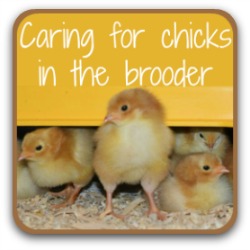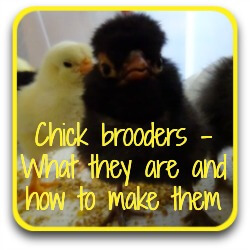- Home
- Chicks in the Brooder
- Drink
What do baby chicks drink in the brooder?
So you've got your brooder set up, there's a reliable heat source and you've worked out what food they need.
But what do baby chicks drink?
Chicks can survive without food or water for between 48 and 72 hours after hatching. The yolk, which they absorb in the hours before hatch, provides all the nutrition they need.
But after that (I tend to move them to the brooder as soon as they've fluffed up, and no longer than 48 hours after hatch) they will need both.
Be sure you have supplies well in advance. Don't wait until your chicks are in the brooder – plan ahead!
In this article, we'll look at what chicks from one day old need to drink, the importance of keeping it clean, and how it's best to provide it in order to keep your chicks safe.
If you purchase a product through links on this page, I may receive a small commission at no extra cost to you. I only recommend products I have bought (or would buy) myself, and which I believe will genuinely benefit you. You can read my full disclosure policy here.

What do baby chicks drink? Water first.
Baby chicks need to drink water. Simple.
Without it, they will dehydrate and die very, very quickly. All you need to do is make sure it's kept plentiful, clean and fresh.
But that can be easier said than done. Chicks tend to kick their bedding and food all over the place, including into their water. And they will perch on the edge of water containers and poop into it.

All of which makes the water dirty. And the last thing you need is chicks picking up bacteria from their water supply.
There are two basic options available: a ground waterer and a hanging bottle system.
Personally, I use the hanging system, but let's look at the pros and cons of each, starting with the basic ground waterer.

Make sure your chicks know how to drink.
As soon as you take a chick out of the incubator, dip her beak into the water if you're using a ground system, or tap her beak against the waterer if using a hanging system.
You only need to do this once – chicks are very quick learners.
Just keep an eye on them for a day or two to make sure that everyone is getting their fair share. It's very important that they all keep hydrated, otherwise you're likely to get issues like pasty butt, which can be fatal.
 Make sure chicks have enough water - use two containers if necessary.
Make sure chicks have enough water - use two containers if necessary.
What do baby chicks drink water from?
The inexpensive option is to put some fresh water in a bowl and leave the chicks to it.
The problem with that is that chicks are naturally inquisitive. And inquisitive chicks can easily fall into bowls of water, and drown.
So if that's your only option, put something in the bowl to prevent that happening. Some clean pebbles are a good idea – the kind you'd use for a terrarium, for example.
Do not buy dyed stone: the chemical dye will leach into the water. This kind of natural, polished stone is fine.
Mason jar waterer.
The mason jar waterer is my choice for a ground based product. It's not cheap (at least in Europe), but it will last much longer than the plastic style.
And OK, I admit it – I just like the way it looks.
Pros :
- Easy to set up
- Easy to clean
- Heavier than the plastic watering systems, so not as easy to tip over
- No chance of chemicals leaching into the water if using Apple Cider Vinegar (see below), as with some poorer quality plastic systems.
Cons :
The problem with any kind of ground based drinking system is that baby chickens kick. A lot. They kick shavings, they kick food, they kick anything that gets underneath their feet.
It's in their nature. They're just experimenting with foraging.
So it's quite difficult to keep the water clean. You'll find yourself clearing out the dish several times a day. If you don't, the danger is that the water will become infected – and so will the chicks.
There is also a small risk of tiny chicks drowning even in this dish. Again, it's easily avoided by adding a few pebbles.
The best way to avoid all the problems with ground waterers, though, is simple: use a hanging system.

How to avoid dirty drinking water: hanging waterers.
I used to use a bottle waterer which hangs from the side of the brooder.
It's made from 'Brooder Bottle Caps' from 'The Chicken Fountain'. It's a simple nipple attachment, screwed into an everyday soda bottle.The chicks tap the nipple and, as if by magic, water drips out!
It works a treat. My baby chicks always get the hang of drinking from it immediately they're introduced into the brooder at just a few hours old, and can't wait to use it ever after.
 These chicks are just a few hours old and already expert at using the brooder bottle cap system.
These chicks are just a few hours old and already expert at using the brooder bottle cap system.Sadly, these are no longer available to buy, and the ones I had somehow got lost.
So I found an alternative. It's this one (make sure to click on the model which includes the water bottle and base, otherwise trying to find the right size can be difficult).
Pros.
- Easy to set up
- Inexpensive
- Chicks learn how to drink from it immediately
- Keeps water completely clean.
Cons.
- No current system is as handy as the original "brooder bottle waterer", but other than that there aren't really any drawbacks to speak of. You just need to make sure the bottle part is centered so it doesn't hang to the side.
- Chicks can get a bit messy and slop drips onto the shavings in the brooder. To avoid this, I simply place a piece of absorbent matting underneath.
I also have the feeder version of this waterer which I love just as much - they are exactly the right size for a brooder box. Again, make sure you choose the one which includes the feeder bottle as well as the harness which is $20.99 - for some reason I can't link to it direct.

Can baby chicks drink Apple Cider Vinegar?
I have an entire article about apple cider vinegar, the claims made for it, the research findings which evidence exactly what it is and is not useful for, and how to offer it to your flock.
- The short answer is 'yes'. Apple Cider Vinegar (ACV) is good for the digestive system of even very young chickens.
- Some people believe it helps avoid pasty butt; however there's no evidence of that.
- Make sure you buy the organic, unpasteurised ACV which contains the 'mother'. This is critical. The ordinary vinegar you buy from supermarkets won't work.
- Braggs' is one of the very best.
- For baby chicks the dilution should be much weaker than for adults. Research suggests to use 5 ml per litre of water (a teaspoon to about 4 cups).
- Bear in mind that with any form of metal waterer, the acid in the vinegar will corrode the metal which will leach into the water. If you're going to use ACV, stick with plastic or glass waterers.
- Where to get ACV from? You'll find it in pet shops but generally speaking it's less expensive to buy online.

Other ways to keep baby chicks healthy.
It can seem like a minefield when you first raise chicks: what's good to feed them at what age, what's not good, what treats are healthy for them ...
If those things are a concern for you, these articles will help.Click on any of the buttons for more information.
- Home
- Chicks in the Brooder
- Drink

















